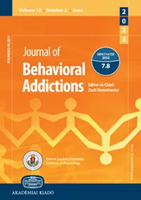Genetics of gambling disorder and related phenotypes: The potential uses of polygenic and multifactorial risk models to enable early detection and improve clinical outcomes
Genetics of gambling disorder and related phenotypes: The potential uses of polygenic and multifactorial risk models to enable early detection and improve clinical outcomes
Author(s): Varun Warrier, Samuel R. Chamberlain, Shane A. Thomas, Henrieta Bowden-JonesSubject(s): Social psychology and group interaction, Personality Psychology, Clinical psychology, Behaviorism, Substance abuse and addiction
Published by: Akadémiai Kiadó
Keywords: polygenic risk scores; multifactorial risk scores; problem gambling; early diagnosis; early intervention;
Summary/Abstract: Gambling Disorder (GD) is an impactful behavioural addiction for which there appear to be underpinning genetic contributors. Twin studies show significant GD heritability results and intergenerational transmission show high rates of transmission. Recent developments in polygenic and multifactorial risk prediction modelling provide promising opportunities to enable early identification and intervention for at risk individuals. People with GD often have significant delays in diagnosis and subsequent help-seeking that can compromise their recovery. In this paper we advocate for more research into the utility of polygenic and multifactorial risk modelling in GD research and treatment programs and rigorous evaluation of its costs and benefits.
Journal: Journal of Behavioral Addictions
- Issue Year: 13/2024
- Issue No: 1
- Page Range: 16-20
- Page Count: 5
- Language: English

